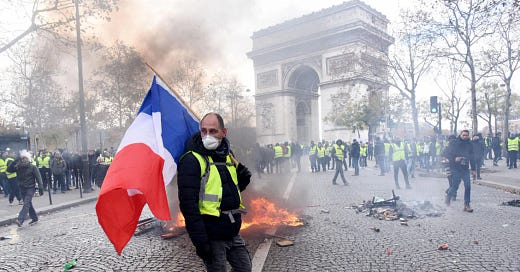Confounding the Australian stereotype, I’ve never been a great drinker - something of an impediment in a nation where no social, cultural, political, financial, familial, emotional or, frequently, sexual transaction is regarded as truly concluded without all parties downing one or more tumblers of icy tonsil-numbing lager.
Even in wine-loving France, my intake has remained modest, so there was no temptation to follow those friends who accepted the “Dry January” challenge of giving up alcohol entirely for that month. (Those who stopped by over the weekend to slake their thirst didn’t exactly reach for the first glass with trembling hands but one did feel there was little chance of their abstinence surviving until Valentine’s Day.)
I’ve watched with the helplessness of the unaddicted as friends drank themselves to death. If that wasn’t education enough, a visit paid to Finland in midwinter would have done the trick. Despite government control of alcohol, legally available only from distribution points that are less like bottle shops than post-offices, the Finns consume on an Olympian scale. The friend who showed me around Helsinki in a frozen February steered me past frequently belligerent drunks who slumped in doorways, some lacking extremities lost to frost-bite.
Ready to tout France as admirably abstemious by comparison, I was surprised to read that, according to its Ministry of Health, alcohol is responsible for 49,000 French deaths every year, and, across Europe, seven percent of all premature illnesses and deaths.
So what is the government doing about this?
Well, there we have a problem. Because the French wine industry, rightly regarded as a national treasure, is large and vocal; even more so since consumption has been declining for years, not only locally but across the world, as young drinkers switch to cocktails and fruit-juice-based “alcopops”.
Last summer, there was talk of raising taxes on wine to combat binge drinking, but President Macron’s losing his majority made that politically unwise and, probably, unachievable. Nobody has forgotten the Gilets Jaunes protests of a few years back, with bonfires in the Champs-Elysèes and near-anarchy in the streets as the rural majority protested an increase in the cost of petrol.
Hence the government's somewhat tentative policy on inebriation. (Well, when I say “policy”, it’s more of a recommendation.) Limit yourself, they suggest, to two glasses of wine (or equivalent) per day, and don’t drink every day.
Seriously?
For the national response, look no further than the French supermarkets’ sprawling wine and spirit departments, and the cartes de vins of restaurants; as large, if not larger, than the menu. No aperitif before lunch? No bottle (or two?) of bordeaux or bourgogne with the meal? No cognac with coffee? Une carafe d’eau, m’sieur? One can imagine the waiter’s withering sneer.
To be fair, French officialdom doesn’t exactly condone drinking to excess. To be in “a state of manifest drunkenness” in a public place in still a crime. But the maximum punishment is a €150 fine; not exactly a major deterrent. And whether you’re charged is up to the police, who are notoriously lenient in such matters. As for breathalyzers for drivers or designated blood-alcohol levels ….well, can we get back to you on that?
I’m probably betraying some innate cultural prejudice but, in my experience, the worst drinking to take place in Paris and, indeed, across continental Europe, is done by visitors; specifically the louts from Britain and elsewhere who invade during football season. If the French do drink to excess, they are generally quiet about it. Another expatriate, the American poet Marianne Moore, set down in her poem Silence some rules about such behaviour which the French largely respect and the rowdier visitors might ponder.
“….My father used to say….. ’The deepest feeling always shows itself in silence;
not in silence, but restraint.’
Nor was he insincere in saying, ‘Make my house your inn.’
Inns are not residences.”






As you know, I lived in Dublin for a few years. It had a lively pub culture but most of the drinkers I met were higher on talk than alcohol. The closest I came to being inebriated was in Cork, when I served on the jury of its Film Festival. As the event was underwritten by the Guinness brewing family, alcohol was plentiful and cheap. I'd never been a juror where the first screening of the day couldn't begin until the cocktail cart arrived and its contents had been sampled.
This is interesting John, as the Irish are often viewed as the heaviest drinkers in the world! And places like Dublin in particular play on it by promoting fun filled drinking at exorbitant prices to tourists.